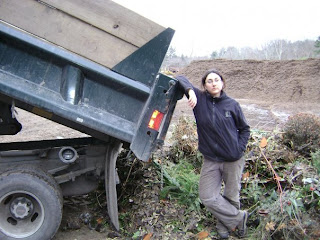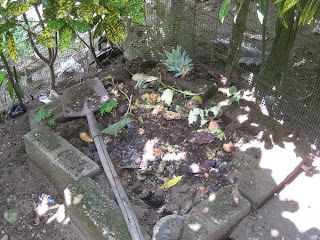At the time, I was a farm apprentice at Hay House Farm, a small, sustainable farm on the Connecticut shoreline. As farm apprentice, part of my reponsibility was to make sure every single shred of organic waste ended up as compost; compost was an integral part of creating the healthy and abundant vegetables and flowers that we sold at the farmer's market weekly.
Each morning I woud set out with a cart full of compost materials: food scraps from our delicious meals, the leftovers from restaurant kitchen scraps used to feed the chickens, hair cut remains from one of the adorable Lhasa apso dogs that followed us around the farm. I would haul the materials to one of the chicken coops and, amidst a flurry of squacking hens, dig a sizeable hole in the dirt floor of the coop, burying it all. A few weeks later, when I went to turn and aerate the chicken coop floor, I would be amazed to find the majority of my piles aleady decomposed. Periodically throughout the season, we would dig out the chicken coops and add to the large piles of compost that we used to feed the gardens. This was my first lesson in the cyclical beauty of composting.
So, what exactly is composting? Put simply, composting is the decomposition of organic material; when we gather our carbon and nitrogen filled organic waste- kitchen scraps, leaves, grass etc.- and create an ideal environment for decomposition, tiny microorganisms feed on the waste and break it down into its simpliest parts. The product is a fiber-rich hummus, filled with inorganic nutrients (nitrogen, phosphorus, potassium) that is perfect for feeding vegetable and flower gardens. For us crazy gardeners, compost is like gold.
The microorganisms responsible for this amazing alchemy have a few requirements. First of all, because they break material down through aerobic respiration (are you having flashbacks to highschool biology?) they require adequate amounts of oxygen. Turning the compost pile regularly is enough to give the little buggers plenty of 02. Without oxygen, the decomposition process turns anaerobic, otherwise known as fermentation (think swamp). If your compost pile begins to reek, you probably aren't turning your pile enough. A well aerated compost pile does not smell!!!
A successful compost pile also needs adequate water (but not too much!) and the proper ratio of carbon to nitrogen. Compostable materials are divided into two categories, green materials and brown materials. Green compost materials (kitchen scraps, grass clippings, dead house plants) are high in nitrogen whereas brown compost materials (dried leaves, twigs, pine needles) are high in carbon. The organisms that decompose organic material use carbon for energy and nitrogen to produce new cells at a ratio of about 30 C to 1 N. Too much green materials in your compost pile, and the organisms emit excess nitrogen as stinky ammonia, or NH3. Too much carbon-filled brown compost, and the decomposition process slows drastically, as the organisms do not have adequate nitrogen to grow their colony.
So, why should you give a shit if you aren't growing anything? Composting isn't only for gardeners and farmers. Anyone who cares about the earth should be educated about the environmental benefits of composting their organic waste. Currently, at least 25% of our landfills are comprised of food waste and yard waste. Because of the lack of oxygen in a landfill, the decomposition of organic material becomes anaerobic. This means that large amounts of methane gas (CH4), a greenhouse gas that, according to the EPA, is "over 20 times more effective at trapping heat in the atmosphere than carbon dioxide", is emitted into the atmosphere due to organic waste being thrown into landfills. Not great. And although trapping methane gas from landfills to use as energy is the newest craze, i personally think that keeping food and yard waste out of landfills and using it to make rich soil that can replenish the earth seems a tad more sane. But that's just me.
Check out the EPA's website http://www.epa.gov/osw/conserve/rrr/composting/benefits.htmers for more reasons to compost.
---------------------------------------------------------------------------------------------------------------------
So, just when I was feeling pretty smug about my self-proclaimed environmentalist status, my idealic days at Hay House Farm came to an end and I moved to Boston. It was time to see what I was really made of; my adventures in urban composting began.
Over the past 5 years of urban living, I have tried it all. When I initially moved to Boston, I worked as a professional landscaper. I brought my compost to work in a tuberware and tossed it into the piles of yardwaste that we composted at a local farm. I'll admit it- kind of ridiculous. When I moved to Cambridge and left my landscaping job, I attempted to use a shoddy compost bin in my backyard. My landlord was quick to veto that idea; I didn't really blame him.
I soon discovered the Cambridge 'food scraps drop-off' initiative. I'd bring my kitchen scraps in a bucket during the drop-off hours and I could sleep easy knowing that they were not sitting in a landfill turning to methane. Phew. And now, living in Providence I am lucky to be only blocks away from Whole Foods, where a nice compost bin stands at the entrance awaiting me and my smelly compost. Whole Foods has made considerable efforts to compost nationwide- check it out:
http://blog.wholefoodsmarket.com/2009/01/composting/
Starting my own gardening business has brought on the additional responsibility of composting yard waste at a larger scale. One day, I hope to run a small, sustainable farm- much like Hay House- where i can compost on premises and use that to feed the many garden's I care for. But for now, running my small business quite unglamorously out of my urban apartment means paying someone else to take my yard waste, letting them turn it into compost, and then buying it back later on to then feed a client's garden. Only in the city. On a more positive note, several of my more rurally located clients decided to start their own composting efforts in their backyards; nothing makes me happier than passing the torch of environmental stewardship.
So, do I compost every single shred of organic remains that crosses the threshhold of my apartment? Not exactly. But I do make a conscious decision to do the best I can and, for the most part, my rotten leftovers and banana peels end up as compost feeding someone's garden. So, until the day that I'm out of the city and can easily walk out my backdoor to compost, I just remember that every tiny effort to be environmentally conscious, as tedious and smelly as it may be, is an act of gratitude and respect for our lovely momma earth.
Dropping of landscape waste to be composted at a small farm in Weston, MA
Compost pile behind my humble abode in Costa Rica.
Lovely compost bins at Whole Foods make life for the urban composter a little easier.


